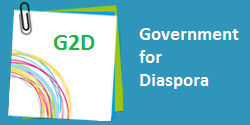 Although anyone with Internet access can open a Facebook or Twitter account in a matter of minutes, creating an efficient and interactive environment between state institutions and citizens abroad is no easy task.
Although anyone with Internet access can open a Facebook or Twitter account in a matter of minutes, creating an efficient and interactive environment between state institutions and citizens abroad is no easy task.
Over the last few years, social media has revolutionized the way people and institutions communicate and interact. Today, the big question for governments around the world is how to use innovative IT tools to engage diasporas in an ongoing, sustainable, result-oriented and cost-effective dialogue. Here are a few ways that social media helps facilitate that dialogue.
- Social media allows better participation of diasporas in policy making. In the case of the Republic of Moldova – my country – as many as one million citizens of its population of 3.6 million are living abroad. Building online communities through social media helps these citizens stay connected to the policy process. One example of this connection is when the Moldovan government was adopting transport fees (vigneta) for cars with foreign license plates that were entering or transiting Moldova’s territory. When the diaspora expressed their frustration over these fees through social media – since many migrants return to Moldova driving cars with foreign license plates to visit relatives or take vacations – the government was pressured to revise the fee structure.
- Social media allows governments to “discover” the most prominent and successful members of diasporas, whose knowledge and expertise could be used to advance national initiatives. State authorities must often invest considerable financial resources to acquire outside expertise on key subjects, especially in developing countries. However, social media has helped the Moldovan government identify prominent Moldovan economists and financial experts that work for institutions such as the World Bank, private banks, non-governmental organizations or important universities. Subsequently, the government has been able to easily reach out to these important diaspora members to initiate a dialogue, even inviting many citizens to serve as advisors within the Moldovan Prime Minister’s Economic Council.
- Social media helps solve the collective action problem faced by governments when it comes to engaging diasporas in national matters. A majority of the world’s countries allow their citizens to participate in elections abroad at diplomatic missions or consular posts. This process takes a great effort of coordination and awareness-raising by state authorities, since migrants typically do not have the same incentive to vote as those remaining in the country of origin. One of the biggest challenges is to inform diaspora members about the election process, as well as keep them up to date with news and developments. Under these circumstances, social media is a tremendous help, because it allows governments to easily and directly communicate with diasporas.
- Social media allows diaspora members to have virtual access to government officials and politicians. While I was an economics student at the University of Chicago, I still followed the economic reforms in Moldova, my home country. Since the Head of Moldova’s Parliament Commission on Economy, Budget and Finances is active on social media, I had the chance to discuss different policy initiatives with him, as well as express my opinion about the economic reasoning of these initiatives. The possibility to engage in serious conversation with one of the Moldovan Parliament’s most important members while abroad made me feel like I was part of the national policy-making process, even though I was thousands of kilometers from home.
- The limitation of social media use can have political costs. Limiting access to social media platforms can harm the relationship between governments and citizens living abroad, since social media is viewed as one of the most important “bridges” to connect diasporas with their home country. For example, when state authorities in Turkey limited citizens’ access to one of the most popular social media platforms, the decision was widely criticized both internally and internationally, placing substantial pressure on Ankara.
Before building a social media strategy and action plan for their respective diasporas, governments and other state institutions first have to be aware of some standard building blocks that have to be put into place:
- Governments have to map their diasporas using information about diaspora distribution around the globe. This is extremely important for determining which social media platforms ought to be used by governments for engaging communities of migrants – i.e. Facebook or Twitter for the United States, Canada or Europe, and QZone or Weibo for China.
- Governments have to nominate an existing agency, or create a new one, that will be responsible for promotion of social media use for national matters. In the Republic of Moldova, the leadership role was given to the e-Governance Center, which was established by the government in order to promote e-transformation of the country.
- It is essential for governments to adopt legislation related to the use of social media by state authorities, as well as develop special guidelines and trainings for officials who are responsible to engage diasporas. Government employees responsible for interacting with communities through social media must follow standard rules of communication and respect professional ethics.
- One of the most important elements of engaging diasporas using social media is to consistently provide feedback and not respond to provocations from other participants in the virtual space. Users might voice their discontent about governmental policies or the performance of a certain politician in an aggressive and impolite manner, or even use inappropriate or insulting language. In these cases, state authorities should respond in a polite and professional manner and set the example for others, as well as preserve reputation and sustainability of cooperation.
Social media will undoubtedly play an increasing role in the relationship between governments and their diasporas abroad. The capacity of social media platforms to serve as not only a tool for communication and community building, but also for service delivery, will provide new opportunities for strengthening the relationship between migrants abroad and state institutions in their home country. As a result, special attention must be paid to adopting regulations and guidelines related to social media use and training of civil servants, in order to develop mutually beneficial projects in different areas.


Join the Conversation